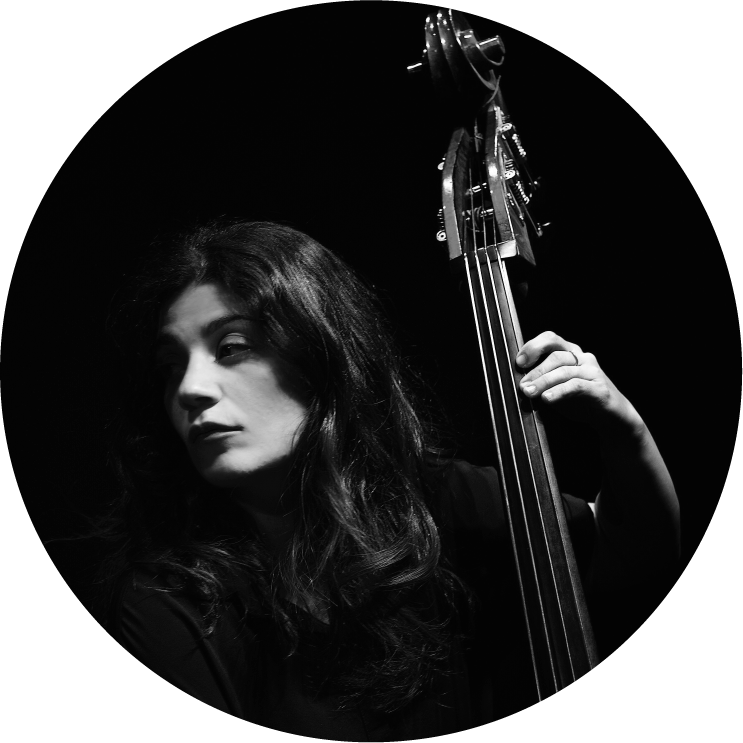The music of Ilaria Capalbo does not merely unfold — it breathes, pulses, and remembers. Listening to the Italian composer and bass player feels like being plunged in another dimension. Her instruments — double bass, electric bass, and electronics — do not stand apart from her: they are vessels for something elemental. Far from the trope of jazz virtuoso or any contemporary jazz trend, her music stands alone in its ground-shifting intensity and profound emotional impact.
Known for moving seamlessly across genres, Capalbo has nevertheless maintained a dynamic relationship with tradition and the influences who have shaped her practice. The Italian musician and composer incorporates elements from classical orchestration, jazz arranging, free improvisation and rock music in her composing process, using often unconventional techniques to build bridges between extremely polarized sonic landscapes.
Crafted from the point of view of the bass and its role in an ensemble, Capalbo’s music is rooted in the relationship between body and instrument and the impact of this synergy in the creative process. It is constructed to rely on every musician in the ensemble as an unique, equally important voice. With a predilection for larger bands and multi-section ensembles, it is no wonder that Capalbo’s use of electronics/effects doesn’t simply aestheticizes the hardware, it harnesses and envelops its power in an already complex sound palette. Lira has defined her playing as “strong, visionary, architectonic” and All About Jazz has praised her music as “a delight [which] bolsters the faith in the future of jazz”.
Capalbo’s debut album Karthago (2022), composed during the pandemic, laid the foundation for her practice of methodical, journal-like composition. A meditation on loss and reconstruction, the album’s sonic architecture is built on the interaction of two, five or seven musicians. Like in the emphatic opening track, Belóved, where the urgency and driving force we sometimes feel in human relations is displayed through chiseled lines for brass and woodwinds. Or in the apocalyptic title track Karthago, where the listeners assist to the cataclysmic unfolding of fate. Listeners and critics alike responded to the album’s layered complexity and the music has since been performed in some of Europe’s most prestigious venues and festivals. Capalbo has continued to forge a distinct path through the oceanic possibilities of contemporary jazz, steadily collaborating with artists from the world of classical music, pop, and avant-garde, while always retaining her unmistakable sound.
Capalbo resists the linear path. Her practice, informed by an education in double bass and composition at the Conservatory of Salerno and Stockholm’s Kungliga Musikhögskolan, as well as a degree in Visual Arts from Accademia di Belle Arti in Napoli, relies on live performance as means of compositional development, as if it were a “living organism.” With further studies in Sound Art at Stockholm’s famed arts university Konstfack she weaves a synesthetic language that collapses the boundaries between disciplines.
Capalbo’s music moves through extremes — from silence to saturation, from minimalist textures to near-orchestral density. It is less a showcase of virtuosity than a vessel for a deeper message. Sound, in her world, is sculpted, stretched, and maxed out until it becomes something else entirely — a kind of presence, alive with tension, release and the possibility of becoming. Although a reference to her influences is evident in her production, Capalbo’s compositions seem to address a larger question: what does it mean to engage in the act of creation and to exist as a human in this time and age? Even then, her work is far from autobiographical — it is devotional.
Her composition resume extends to contemporary dance, film and theatre. A steady collaborator of contemporary dance company Cullberg and choreographer Freddy Houndekindo, she has premiered commissioned work at multidisciplinary festivals such as EarEye Festival in Malmö and Explorations of Now in Stockholm.
In 2025, she will release her second album — The Brightest Sun, recorded in late 2024 — a work that originates from the radical reorientation of new motherhood. If Karthago was shaped by ashes, the new chapter is shaped by water: fluid, luminous and tidal.
Capalbo’s music lingers in the body. It echoes in the spaces we carry inside. It asks nothing but presence — and offers everything in return.

